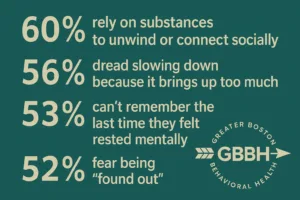You get up every day. You get things done. You show up at work, for your family, for everyone. You might even look calm, capable, and organized from the outside.
But something inside you is fraying.
You’re tired in a way that sleep doesn’t fix. Maybe you’re using more than you meant to—alcohol, screens, substances, perfectionism—just to numb it all. Maybe your mind doesn’t slow down unless you override it. Maybe you’re white-knuckling your way through what used to feel manageable.
And here’s the thing no one tells you enough: you don’t have to wait until you fall apart to get support.
You don’t have to “hit bottom.” You don’t need to have a dramatic breakdown. You don’t even need to be sure that anything is “wrong.”
You just need to be honest enough to say: This isn’t working anymore.
High-Functioning Isn’t the Same as Healthy
There’s a whole category of people who function at a high level—until they quietly crash.
They don’t miss deadlines. They keep relationships intact. They might even get praise for how “together” they seem. But underneath the surface, they’re running on fumes.
If that’s you, here are some signs it may be time to pause and check in:
- You dread slowing down because it brings up too much.
- You rely on substances to unwind or connect socially.
- You can’t remember the last time you felt rested mentally.
- You fear being “found out” or not being able to maintain the illusion.
- You feel emotionally detached but still perform well.
That’s not just stress. That’s strain—and over time, it adds up.
You Don’t Need a Crisis to Qualify for IOP
There’s a common misconception that Intensive Outpatient Programs (IOPs) are only for people fresh out of rehab or those who are “really struggling.”
But the truth is, IOPs are designed to support people before they reach crisis.
At Greater Boston Behavioral Health, our IOP offers a safe and structured environment where high-functioning adults can slow down, explore their inner world, and develop healthier ways to cope—without disrupting their entire life.
We’ve worked with attorneys, nurses, parents, grad students, entrepreneurs, teachers, and people just like you who are tired of carrying so much on their own.
What an Intensive Outpatient Program Really Offers
Here’s what IOP looks like in real terms:
- 3–5 days per week of structured therapeutic support
- Group sessions that go deeper than surface-level support
- Individual therapy that helps you unpack patterns, shame, or emotional avoidance
- Optional medication management or psychiatric oversight
- A non-residential format, so you sleep at home and keep working if needed
If you’re looking for an Intensive Outpatient Program in Needham, MA or nearby, our program combines real-world flexibility with clinical depth. You don’t have to pause your whole life. But you do get space to finally take care of yourself.
High-Functioning Addiction: The Quiet Struggle
Alcohol or substance use among high-functioning adults often hides in plain sight.
Maybe it started with drinks after work. Maybe it’s how you unwind at night. Maybe it’s become the only reliable off-switch for your mind. You’re still holding it together, but that’s becoming harder—and scarier.
It doesn’t mean you’re weak. It doesn’t mean you’re a fraud. It means you’re using coping mechanisms that worked until they didn’t.
An IOP offers a place to talk about those patterns without fear of judgment, label, or exaggeration. We don’t assume collapse. We don’t push 12-step language. We meet you in the nuance: functional, but hurting. Capable, but disconnected. Present, but tired.
The Emotional Cost of Waiting for Collapse
One of the hardest truths to accept is that many people wait too long. Not because they don’t care—but because they’re afraid to look weak, afraid to be the one who needs help.
But the cost of waiting for your life to fall apart?
- Emotional distance from people who care about you
- Deepening reliance on coping mechanisms you wish you didn’t need
- Lingering shame that chips away at self-worth
- A growing gap between your external image and internal experience
Starting IOP is not giving up. It’s investing in the part of you that still wants things to feel better.
You Don’t Need a Breakdown—You Need Breathing Room
Most high-functioning people don’t need a dramatic overhaul. They need breathing room, support, and a place to drop the mask.
At Greater Boston Behavioral Health, we offer IOP care for people who:
- Are tired of managing everything alone
- Want real tools, not just crisis response
- Need mental health care that respects their schedule and capacity
- Value privacy, professionalism, and emotional intelligence
Whether you’re in Boston or looking for an Intensive Outpatient Program in Dedham, MA, our team is here to help you take the next step—without shame, assumptions, or pressure.
What If You Don’t Know What’s Wrong?
That’s okay.
Some people enter IOP knowing exactly what they want to work on. Others just know they’re not okay.
You don’t need to have the words yet. You don’t need to justify your decision to seek help. If the life you’ve built is starting to feel harder to hold together—and you don’t want to keep waiting—then that’s reason enough.
Therapy helps name what’s been hard to say. IOP helps treat what you’ve been carrying alone.
FAQs: IOP for High-Functioning Adults
Is IOP only for people with substance use issues?
No. Many IOP clients are working through anxiety, depression, trauma, burnout, or emotional dysregulation. We support both substance-related and non-substance-related challenges.
Will I have to stop working if I start IOP?
Not necessarily. Many of our clients work full or part-time and schedule IOP sessions around their availability. We offer both daytime and evening programs to accommodate different needs.
What if I’m not “sick enough” for IOP?
If you’re asking that, you’re probably closer to needing support than you think. IOP is not just for severe cases—it’s for people who are ready to do focused work before things worsen.
How is IOP different from regular therapy?
IOP offers a higher level of care. More sessions per week, more structure, and more coordinated support. It’s ideal for people who need more than once-a-week talk therapy, but don’t require hospitalization.
Can I talk about work stress and relationships in IOP?
Yes. We encourage it. Life doesn’t stop just because you’re in treatment. In fact, much of the work in IOP is about learning how to live more skillfully in your current life—not avoiding it.
You Don’t Have to Be in Crisis to Choose Care
You just have to be honest enough to admit that something’s off—and brave enough to believe something better is possible.
You’ve held so much together for so long. But you don’t have to carry it all alone.
Call (888) 450-3097 to learn more about Intensive Outpatient Program in Boston, Massachusetts.
You’re allowed to get help before it gets worse. We’ll help you figure out the rest, together.


